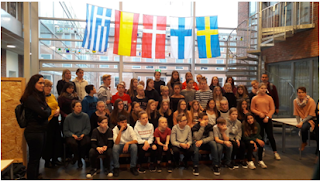DESCRIPTION
The idea of this project was born when we tried to
improve students’ learning. In all our schools we noticed that a large fraction
of our students regardless of background, lacked confidence in their own
academic performance, had problem to focus their attention and gave up as soon
as some resistance occurred and therefore had very limited academic success. We
wanted to find a way to teach our students to overcome these obstacles.
Pedagogical research has shown that the highest impact
factor on school learning is the quality of the teacher and what the teacher
does in the classroom (these factors having much higher impact than variables
such as class size, homework, etc). Furthermore here is strong evidence that
great teachers are made not born; this means there is great scope for improving learning by
adopting the most effective classroom techniques.
The US Education Endowment Foundation in reviewing
empirical studies found that feedback from teachers to students and
metacognitive strategies (helping pupils think about their own learning
explicitly) were the two most effective ways of improving teaching and learning
in the classroom (The Economist 11:th of June 2016). Feedback to students and
metacognitive strategies can be considered as two sides of the same coin, the
first being based on teachers thinking and awareness of the learning process
and then the effective communication to students and the second being based on students own awareness of their own
learning.
Even if curriculum and professional development for
teachers already emphasizes the importance of feedback and metacognitive
strategies the daily routine in schools does not provide explicit opportunities
for students to develop metacognitive strategies. Students need time to learn how,
where, and when to use these strategies effectively. Teachers often make the
wrong assumption that all children will pick up these skills on their own;
sadly these pupils that do not develop critical thinking and learning skills
are often dismissed as having limited learning potential. This project seeks to
implement feedback/metacognitive techniques in the daily practice of the
participating schools as well as guiding teachers in their professional
development using metacognition. The
project will form work groups for teachers and run workshops which will develop
teaching material/lesson plans making use of teacher feedback/student
metacognitive learning - which will then be tested in the classroom.


Comments
Post a Comment